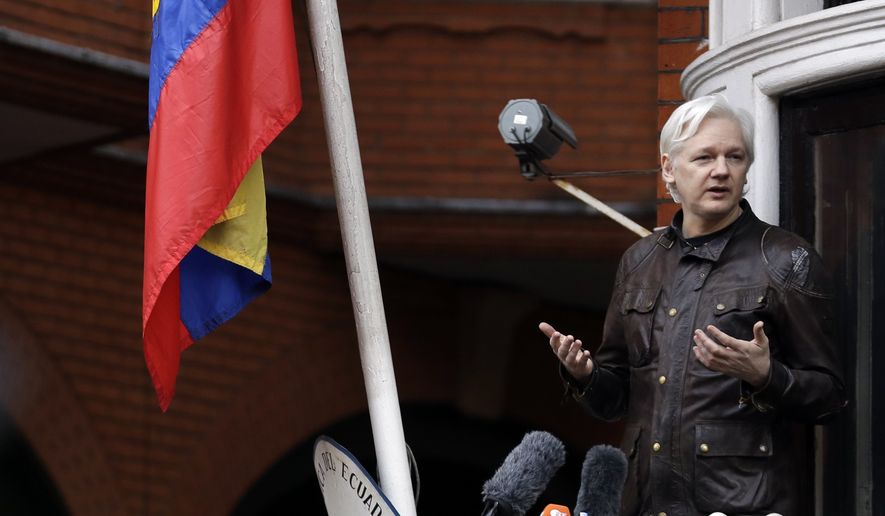Federal law including the First Amendment protects WikiLeaks from being held liable for publishing stolen Democratic National Committee emails during last year’s White House race, attorneys for President Trump’s 2016 campaign argued in a court filing Wednesday.
Responding to a invasion of privacy suit filed in D.C. federal court, the Trump campaign’s attorneys said the email dump concerned “newsworthy and public issues,” effectively legally shielding WikiLeaks from liability.
“Tort law precludes liability because the disclosure was newsworthy. And the First Amendment precludes liability because the emails dealt with public issues and the Campaign did not participate in their acquisition,” the attorneys wrote.
The lawsuit was filed in July against the Trump campaign and former adviser Roger Stone on behalf of a former DNC staffer and two Democratic Party donors personally affected by WikiLeaks’ release a year earlier of thousands of stolen emails. The emails were obtained as the result of a Russian state-sponsored operation targeting Mr. Trump’s former rival, Democratic nominee Hillary Clinton, according to U.S. intelligence officials.
Federal authorities are currently investigating whether Mr. Trump’s associates colluded in any way with Russian operatives while he ran for office.
As investigators in the House, Senate and Justice Department probe for possible ties between the White House and Kremlin, attorneys for the plaintiff attest that evidence already exists indicating the president’s campaign conspired with WikiLeaks with regards to releasing the emails.
In addition to containing sensitive information involving the Clinton campaign, the leak also exposed the plaintiffs’ personal data ranging from Social Security numbers and banking information to private correspondence concerning the former staffer’s sexuality, according to the lawsuit.
In a motion to dismiss Wednesday, the Trump campaign stressed that the case involves the publication of the emails rather than their actual acquisition, while also lauding the release for exposing newsworthy issues of public concern — namely details about the inner-workings of the Democratic Party during last year’s presidential election.
“Tort law protects a publisher from liability for a disclosure that deals with newsworthy issues (regardless of how the publisher obtained the disclosed material). The First Amendment, too, protects a publisher from liability for a disclosure that deals with public issues (at least if the publisher was not involved in the initial illegal acquisition). Here, the DNC emails, taken as a whole, plainly deal with public issues. And Plaintiffs do not (and cannot) allege that the Campaign in any way participated in their acquisition. Tort law and the First Amendment thus both prohibit liability,” Trump’s attorneys wrote.
“Plaintiffs likewise cannot establish vicarious liability by alleging that the Campaign conspired with WikiLeaks,” they argued elsewhere. “Under section 230 of the Communications Decency Act (47 U.S.C. § 230), a website that provides a forum where ’third parties can post information’ is not liable for the third party’s posted information.
WikiLeaks cannot be held liable, the attorneys added, because the website “provided a forum for a third party (the unnamed ’Russian actors’) to publish content developed by that third party (the hacked emails).”
“This is a meritless case. Plaintiffs allege, without factual grounds, that Donald J. Trump’s presidential campaign conspired with Russian agents to publish emails stolen from the computers of the Democratic National Committee,” attorney Michael Carvin argued on behalf of the president.
United to Protect Democracy, a nonpartisan group that brought the suit, said it was reviewing the campaign’s motion and would respond in due course.
Russia has denied meddling in the 2016 U.S. race.
The U.S. Department of Justice began investigating WikiLeaks and its staff, including publisher Julian Assange, after the antisecrecy website began publishing classified Pentagon and State Department documents in 2010.
Members of the Trump administration including Attorney General Jeff Sessions and CIA Director Mike Pompeo have since advocated for shutting down WikiLeaks, notwithstanding Mr. Trump previously praising the site for publishing stolen DNC emails during last year’s race.
Mr. Assange did not immediately respond to a message seeking comment.
• Andrew Blake can be reached at ablake@washingtontimes.com.




Please read our comment policy before commenting.